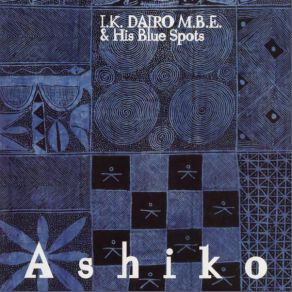Ashiko
Download links and information about Ashiko by I. K. Dairo. This album was released in 1992 and it belongs to World Music, Pop genres. It contains 8 tracks with total duration of 56:54 minutes.

|
|
|---|---|
| Artist: | I. K. Dairo |
| Release date: | 1992 |
| Genre: | World Music, Pop |
| Tracks: | 8 |
| Duration: | 56:54 |
| Buy it NOW at: | |
| Buy on iTunes $7.99 | |
Tracks
[Edit]| No. | Title | Length |
|---|---|---|
| 1. | Kowajo (Come and Dance) | 5:57 |
| 2. | Okete (The Squirrel) | 8:43 |
| 3. | Fona Mi Han Mi (Show My Me Path) | 8:13 |
| 4. | Ekun Rere (All Charged Up) | 4:18 |
| 5. | Yamanta (Ladies) | 6:39 |
| 6. | Salome (A Women's Name) | 10:25 |
| 7. | Daluno Adama (Hello Beauitful Daughter) | 6:20 |
| 8. | Mo Sorire (I Have Been Blessed) | 6:19 |
Details
[Edit]The leader (and one of the creators) of the juju sound, IK Dairo (master of the British Empire) recorded Ashiko in 1992 after finding an overwhelmingly willing audience for his music while on tour in the U.S. The concept of the album was to combine old hits with new songs. By the time of the album, he had been playing consistently for some 35 years, and that experience shows in the sound. This is juju at one of its highest levels. By using only the core of his Blue Spots band, Dairo was able to make a cleaner, crisper sound than many of his older works. Dairo plays his usual juju instruments, the accordion and guitar, as well as the dundun (hourglass squeeze drum), with which he is able to hold both rhythmic and melodic lines. The sound on the album, especially with the guitar styles, seems like a predecessor to the Nairobi beat that has come out after Dairo (but before this album, of course). The music is incredibly powerful with a minimum of instruments, and the influence that Dairo has had on others is apparent (King Sunny Ade, for one). Older recordings of Dairo may be better for pure juju, but the sound quality is sometimes missing. Other late recordings, such as I Remember, may have better studio sound quality than the old ones, but don't have the same energy that Dairo has made his music from. It's a good album for fans of juju, or for that matter, other African subgenres — Nairobi beat, chimurenga, etc.